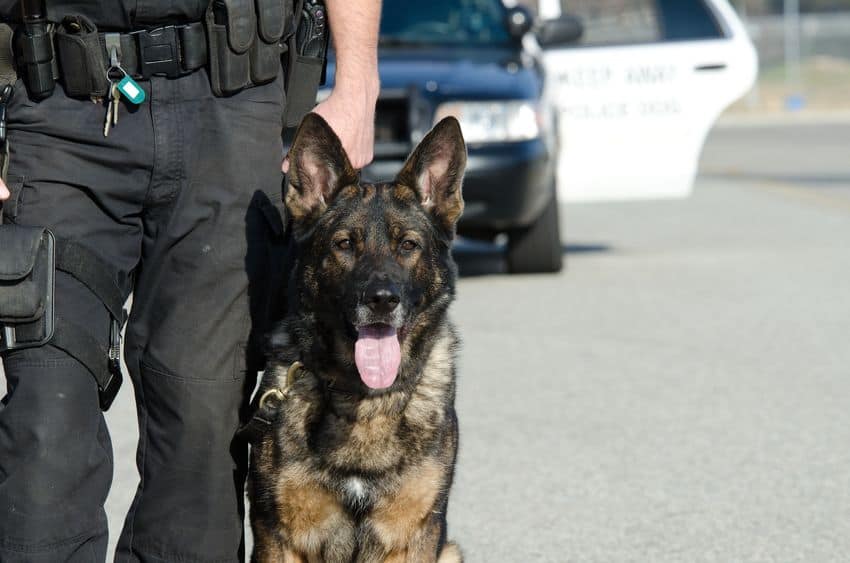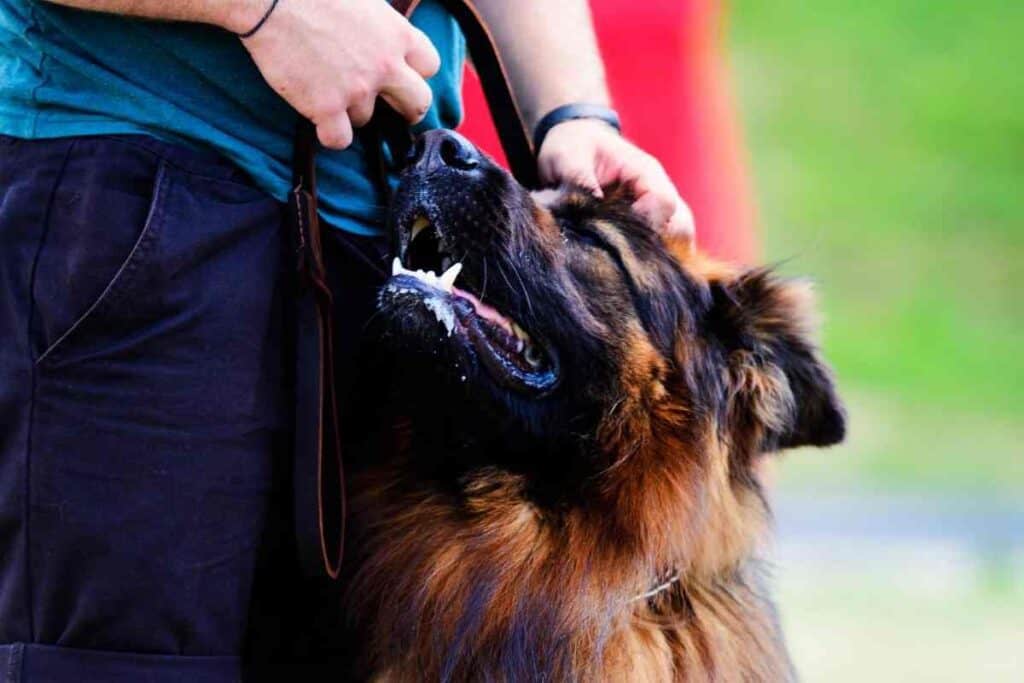Are German Shepherds Good Service Dogs?
German Shepherds are known for their loyalty, intelligence, and protective nature. But what about their ability to serve as a service dog? Can these beloved dogs be trained to assist those with disabilities and provide emotional support? Read on to find out the answer to the primary question: “Are German Shepherds good service dogs?”

German Shepherds are highly intelligent, trainable dogs that can excel as service dogs for individuals with disabilities.
German Shepherds are a popular breed for a reason, and their traits make them ideal candidates for service dog training. These dogs are highly intelligent, trainable, and eager to please their owners.
They are also protective and have a strong desire to work, making them well-suited for the role of a service dog. With proper training and socialization, German Shepherds can provide a wide range of services, including physical support, emotional support, and psychiatric service.
One of the reasons German Shepherds make great service dogs is their versatility. They can be trained to assist individuals with a variety of disabilities, from physical impairments to mental health conditions.
For example, a German Shepherd service dog can assist with mobility by helping their handler balance, retrieve dropped items, or open doors. They can also provide emotional support to those with anxiety or depression by offering comfort and calming behavior.
Expert Tip #1:
- German Shepherds are highly social and bond well with their handlers, making them ideal for individuals who need 24/7 support.
And for those with psychiatric conditions, a German Shepherd psychiatric service dog can be trained to recognize and respond to specific symptoms, such as anxiety attacks or panic episodes.
Why Choose a German Shepherd for Service Work?
German Shepherds are a popular choice for service work due to their high intelligence, trainability, and loyalty. These dogs have a strong work ethic and are eager to please their handlers, making them highly responsive to training. German Shepherds are also highly adaptable and can perform a wide variety of tasks, making them suitable for many different types of service work.
In addition to their training abilities, German Shepherds are also known for their physical attributes that make them well-suited for service work. They are strong, athletic dogs with a sturdy build and powerful muscles, making them capable of performing demanding physical tasks.
They also have a natural protective instinct and are highly alert, which makes them ideal for service work that requires increased vigilance, such as working with individuals with mobility impairments or those who are blind or deaf.

Finally, German Shepherds are known for their strong bond with their handlers and their loyalty, making them a loving and supportive companion. They are highly affectionate and provide emotional support, which can be especially important for individuals with disabilities who rely on their service dogs for daily assistance.
Options For Training A German Shepherd To Be A Service Dog
Training a German Shepherd to be a service dog requires dedication, patience, and a strong commitment from both the dog and the handler.
The process can take anywhere from several months to over a year, depending on the individual dog and the specific tasks it will be trained to perform. Here are some of the most common training options for German Shepherd service dogs:
- Professional Service Dog Training: One of the best options for those looking to get a German Shepherd service dog is to enroll in a professional training program. These programs are run by experienced trainers who specialize in working with service dogs and have the knowledge and expertise to properly train and certify the dog. This option is ideal for those who do not have the time, experience, or resources to train their dog themselves.
- Do-It-Yourself Training: For those who are willing to invest the time and effort, training a German Shepherd to be a service dog can be done at home. This option requires a significant commitment and an understanding of dog training techniques, but it allows the handler to have a greater hand in shaping the dog’s behavior and training. This option may be ideal for those who have a strong bond with their dog and want to be more involved in the training process.
- Group Training Classes: Another option is to attend group training classes, which are designed for dogs of all breeds and abilities. These classes provide a structured environment where the handler and dog can work together to learn obedience, socialization, and basic commands. Group training classes are ideal for dogs that are social and enjoy working in a group setting.

Regardless of which training option is chosen, it is important to remember that training a German Shepherd to be a service dog requires patience, persistence, and consistency.
The handler must be committed to working with the dog every day, even when the training process becomes challenging. With the right training, German Shepherds have the potential to make excellent service dogs, and the bond they form with their handlers can be life-changing.
What kinds of jobs are suitable for a German Shepherd?
A German Shepherd is capable of a tremendous variety of jobs with the purpose of helping others. Here’s a list of a few:
- Guide dogs for the blind, deaf, or physically impaired.
- Emotional support and companionship for those suffering from depression or loneliness.
- Psychiatric service to alert their owners when it’s time to take medication or help calm someone during a PTSD or anxiety attack.
- Help do tasks for someone who might temporarily be unable to do them themselves.
- If your dog is very kind and gentle, they might be good at providing therapy for others, including animal-therapy and helping console with the elderly, those in distress, or people with mental illnesses.
Certification Options For Service Dogs
Certification is an important step in the process of having a German Shepherd recognized as a service dog. This certification verifies that the dog has been trained to perform specific tasks and has the temperament and skills necessary to assist its handler with a disability.
There are several certification options available, including:
- Service Dog Certification: This type of certification is awarded by organizations that specialize in service dog training and certification. To receive certification, the dog must pass a series of tests that assess its ability to perform specific tasks and its temperament. This certification is widely recognized and accepted by government agencies and businesses, making it easier for the handler to take the dog into public places.
- Emotional Support Animal (ESA) Certification: This type of certification is for dogs that provide emotional support to their handlers. Unlike service dogs, ESAs do not have to be trained to perform specific tasks, but they must have a doctor’s letter confirming that their presence is necessary for the handler’s emotional well-being. ESA certification is not as widely recognized as service dog certification, but it does provide some legal protections for the handler, such as the right to live with their animal in “no pets” housing.
- Therapy Dog Certification: This type of certification is for dogs that work in therapy or counseling settings, providing comfort and support to patients. Therapy dogs are trained to be friendly and approachable, and they must pass a series of tests to assess their temperament and social skills. Unlike service dogs, therapy dogs do not have the same legal protections and are not allowed in public places.
Ultimately, the type of certification a German Shepherd receives will depend on the specific tasks it has been trained to perform and the needs of the handler. It is important to research the different certification options available and choose the one that best fits the needs of the dog and handler.
With the right certification, a German Shepherd can be an effective and valued member of a service dog team.
Expert Tip #2:
- Training a German Shepherd to be a service dog requires a significant commitment of time and resources. Make sure you are prepared for the journey before starting.
What is and what is not considered a service dog from both a practical and legal aspect?
Service dogs are specially trained dogs that assist individuals with disabilities by performing specific tasks. From a practical standpoint, a service dog is any dog that has been trained to perform specific tasks that assist its handler with a disability. This can include tasks such as retrieving dropped items, pulling a wheelchair, alerting to an impending medical event, or providing emotional support.

From a legal standpoint, however, the definition of a service dog is more specific. According to the Americans with Disabilities Act (ADA), a service dog is defined as a dog that is individually trained to do work or perform tasks for a person with a disability. The tasks must be directly related to the person’s disability and must be necessary for their daily living.
It is important to note that not all dogs that provide assistance to individuals with disabilities are considered service dogs under the ADA. Emotional support animals and therapy dogs, for example, are not considered service dogs.
While these animals may provide important emotional and psychological support to their handlers, they are not individually trained to perform specific tasks related to a disability and therefore do not have the same legal protections and access rights as service dogs.
In summary, while the practical definition of a service dog is broad, the legal definition is more specific and limited to dogs that have been individually trained to perform tasks related to a disability. Understanding the difference between the two definitions is important for individuals who rely on service dogs and for businesses and organizations that interact with service dogs and their handlers.
Can you get in trouble for calling your dog a service dog if they are not certified?
Yes, it is possible to get in trouble for falsely claiming that your dog is a service dog if they are not certified. In the United States, it is considered a federal crime to fraudulently represent that a dog is a service dog, and individuals can face penalties, including fines and imprisonment.
In addition to the legal consequences, falsely claiming that a dog is a service dog can also have negative impacts on individuals who rely on legitimate service dogs. It can lead to distrust and skepticism of all service dogs, making it more difficult for individuals with disabilities to access public spaces with their service dogs.
It is important to only claim that a dog is a service dog if it has been properly trained and certified. Service dogs must have the skills and temperament necessary to assist their handlers with a disability, and they must have completed a rigorous training program.
If you are considering getting a service dog, it is important to do your research and work with a reputable organization to ensure that your dog has the necessary training and certification.
FAQs:
Can a German Shepherd be a service dog?
Yes, German Shepherds can be trained to serve as service dogs for individuals with disabilities.
Are German Shepherds good emotional support dogs?
Yes, German Shepherds can provide emotional support to those in need due to their affectionate nature and ability to bond with their handler.
What makes German Shepherds good service dogs?
German Shepherds are good service dogs due to their intelligence, trainability, and desire to please their owner. They are also highly social and protective, which makes them ideal for providing 24/7 support.
Additional German Shepherd Articles Worth Reading:
Summary
In conclusion, German Shepherds are excellent service dogs for those with disabilities. With proper training and socialization, these dogs can provide physical support, emotional support, and psychiatric service.
If you are considering getting a service dog, consider a German Shepherd. With their intelligence, versatility, and loving nature, these dogs can make a wonderful addition to your life.
